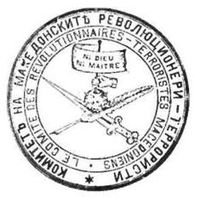
Back Солунски атентати Bulgarian Attentate von Thessaloniki German Απριλιανά του 1903 Greek Bateliers de Salonique French Солунски атентати Macedonian Żeglarze z Salonik Polish Barqueiros da Tessalônica Portuguese Selanikli Gemiciler Turkish Салонікські атентати Ukrainian
| Boatmen of Thessaloniki | |
|---|---|
| Гемиджиите | |
 The seal of the Committee of the Macedonian revolutionaries - terrorists in Geneva (1898). | |
| Leader | Slavi Merdzhanov Yordan Popyordanov[1][2] |
| Dates of operation | 1898–1903 |
| Motives | Autonomy for Macedonia and Adrianople regions |
| Active regions | Istanbul, Adrianople, Thessaloniki |
| Ideology | Propaganda of the deed |
| Slogan | No gods, no masters |
| Notable attacks | Thessaloniki |
| Status | Defunct |
| Means of revenue | Supreme Macedonian-Adrianople Committee |
| Part of a series on |
| Anarchism |
|---|
 |

The Boatmen of Thessaloniki (Bulgarian: Гемиджиите, romanized: Gemidzhiite; Macedonian: Гемиџиите, romanized: Gemidžiite) was a Bulgarian anarchist group, active in the Ottoman Empire in the years between 1898 and 1903.[3] The members of the group were predominantly from Veles and most of them − young graduates from the Bulgarian Men's High School of Thessaloniki.[4] The group was radicalized by the Bulgarian anarchist Slavi Merdzhanov, whose initial target was the capital Istanbul, and subsequently Adrianople,[5][6] but after his execution by the Ottomans in 1901, the group's attention shifted to Thessaloniki.[7] From April 28 until May 1, 1903, the group led a campaign of terror bombing in Thessaloniki.[8] Their aim was to attract the attention of the Great Powers to Ottoman oppression in Macedonia and Thrace.[9] The group's roots can be traced to 1898 in Geneva, and nearly all of its founders were natives from Bulgaria.[10] It was associated with the Internal Macedonian-Adrianople Revolutionary Organization,[11] but also had close ties with the Supreme Macedonian-Adrianople Committee.[12] The result of the bombings was disastrous for the Bulgarian community in Thessaloniki.[13]
- ^ Raymond Detrez, The A to Z of Bulgaria, Scarecrow Press, 2010, ISBN 9780810872028, p. 390.
- ^ Stefan Troebst, Das makedonische Jahrhundert: von den Anfängen der nationalrevolutionären Bewegung zum Abkommen von Ohrid 1893–2001; ausgewählte Aufsätze, Oldenbourg (in German), 2007, ISBN 9783486580501, p. 56.
- ^
- "In 1898 a group named the Boatmen of Thessaloniki was formed and acted in the spirit of propaganda by the deed: the group's members, of Bulgaric origin, carried out deadly attacks against targets including the city's Ottoman bank, hotels, a theater, and light and gas pipes. Nearly all of the group's members were executed." Antonios Vradis and Dimitrios K. Dalakoglou, Anarchism, Greece in International Encyclopedia of Revolution and Protest, Volume 8, Set: 1500 to the Present with Immanuel Ness as ed., Wiley-Blackwell, 2009, ISBN 1405184647, p. 126.
- "The Boatmen of Thessaloniki were an anarcho-nationalist, pan-Slavic influenced Bulgarian militant group, active in Θεσσαλονίκη (Thessaloniki) between 1898 and 1903." Nicholas Apoifis, Anarchy in Athens: An ethnography of militancy, emotions and violence, Manchester University Press, 2017, ISBN 9781526100597, p. 73.
- Giannēs Megas, The Boatmen of Thessaloniki: The Anarchist Bulgarian Group and the Bombing Actions of 1903, Athens: Trochalia (in Greek), 1994, ISBN 9789607022479.
- The A to Z of the Ottoman Empire, Selcuk Aksin Somel, Scarecrow Press, 2010, ISBN 1461731763, p. ixx.
- A History of the Ottoman Bank, Edhem Eldem, ISBN 975333110X, Ottoman Bank Historical Research Center, 1999, pp. 239; 433.
- The Imperial Ottoman Bank in Salonica: the first 25 years, 1864-1890, John Karatzoglou, Ottoman Bank Archives & Research Centre, 2003, ISBN 9759369257, p. 9.
- İlkay Yılmaz, Propaganda by the Deed and Hotel Registration Regulations in the Late Ottoman Empire, Journal of the Ottoman and Turkish Studies Association, Vol. 4, No. 1, p. 142, doi:10.2979/jottturstuass.4.1.08.
- ^ Post-Cosmopolitan Cities: Explorations of Urban Coexistence, Caroline Humphrey, Vera Skvirskaja, Berghahn Books, 2012, ISBN 0857455117, p. 213.
- ^ Mercia MacDermott, Freedom Or Death, the Life of Gotsé Delchev, Journeyman Press, 1978; ISBN 0904526321, pp. 304–306; 350–355.
- ^ Georg Brandes, Human Rights and Oppressed Peoples: Collected Essays and Speeches; Editor William Banks; University of Wisconsin Pres, 2020, ISBN 0299324109, p. 97.
- ^ Dimitar Bechev, Historical Dictionary of North Macedonia; Historical Dictionaries of Europe, second edition, Rowman & Littlefield, 2019, ISBN 1538119625, p. 124.
- ^ Iakovos D. Michailidis, From Christians to Members of an Ethnic Community: Creating borders in the city of Thessaloniki, in Luďa Klusáková and Laure Teulières (eds.), Frontiers and identities: cities in regions and nations, PLUS-Pisa University Press, 2008, p. 174.
- ^ Historical Dictionary of the Republic of Macedonia, Historical Dictionaries of Europe, Dimitar Bechev, Scarecrow Press, 2009, ISBN 0810862956, p. 82; 198.
- ^ Дончо Даскалов, Анархизмът в България, Унив. изд-во "Св. Климент Охридски", 1995, ISBN 954-07-0157-0; стр. 34–36. Doncho Daskalov, Anarchism in Bulgaria, St. Kliment Ohridski Univ. Publishing House (in Bulgarian); pp. 34–36.
- ^ "In April 1903 there was a campaign of bombing in Thessaloniki undertaken by anarchist Bulgarian students associated with IMRO. The bombing was followed by a generalized peasant uprising among the Christians of Macedonia." For more see: Costas Lapavitsas, Pinar Cakiroglu; Capitalism in the Ottoman Balkans: Industrialisation and Modernity in Macedonia, The Ottoman Empire and the World; Bloomsbury Publishing, 2019; ISBN 1788316592, p. 252.
- ^ Duncan M. Perry, The Politics of Terror: The Macedonian Liberation Movements, 1893-1903; Duke University Press, 1988; ISBN 0822308134, p. 101.
- ^ "According to information from Bulgarian commercial agent Atanas Shopov, the authorities killed more than a hundred people and arrested more than three hundred. These included all principals and teachers in the Bulgarian schools, four priests, 25 members of Bulgarian commercial families, 52 wealthy entrepreneurs, and many members of the artisan guilds. Most of these people had no connection with the Gemidzhii or the IMARO." For more see: Dimitris Keridis and John Brady Kiesling as ed., Thessaloniki: A City in Transition, 1912–2012; Routledge, 2020; ISBN 0429513666, Dimitris Keridis, Introduction.
© MMXXIII Rich X Search. We shall prevail. All rights reserved. Rich X Search